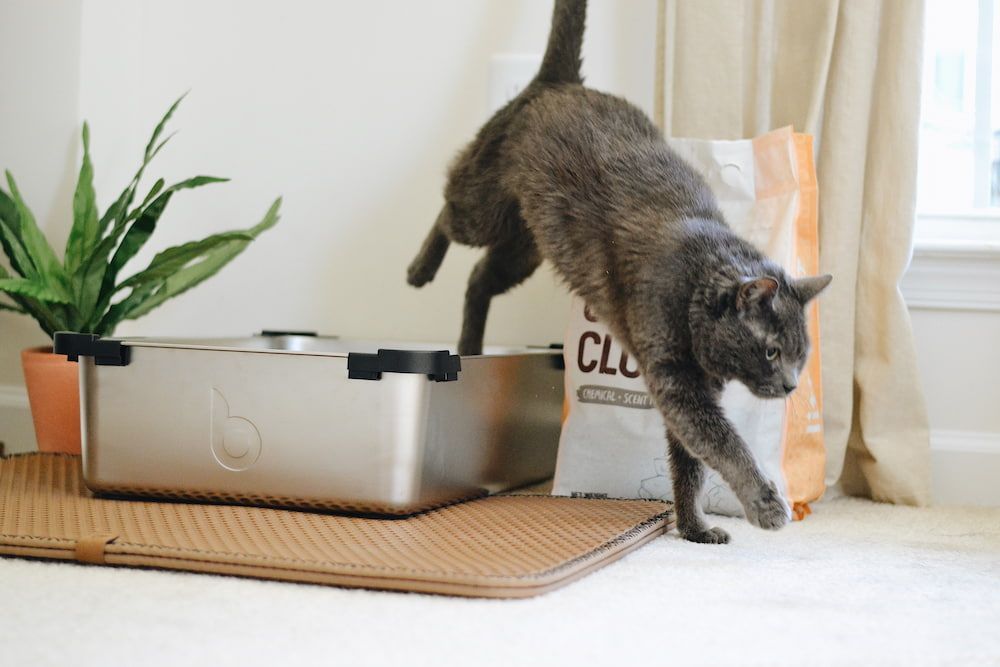Picture this: you wake up to the smell of something…off. You investigate, heart sinking as you realize your beloved cat has left a present outside the litter box. You’re not alone. This common issue, known as inappropriate urination or defecation, often leaves cat owners bewildered and frustrated. But understanding the reasons behind this behavior can be the key to addressing it and restoring harmony in your home.

Image: catisafriend.com
Every cat owner knows their furry companion is a creature of habit. They have their routines, their favorite spots, and their specific preferences. So, when those preferences suddenly change, it’s a sign that something is amiss. This guide delves into the potential reasons why your cat might have decided to ditch the litter box, helping you understand your feline friend’s silent plea for help.
The Litter Box Blues: Unveiling Common Causes
The world of cats is a complex one, filled with subtle clues and unspoken communication. When a cat starts pooping outside the litter box, it’s not a deliberate act of defiance; it’s a desperate attempt to communicate a need, a discomfort, or a distress. Let’s explore the common culprits behind this behavior, offering a roadmap to understanding your cat’s unspoken woes:
1. Litter Box Issues:
- Litter Type: Some cats are finicky about their litter. If you’ve recently switched to a new type, your cat might be protesting. Try reverting to the old litter or exploring alternative options like unscented, clay-based, or even paper litter.
- Litter Box Cleanliness: Cats are meticulous creatures and prefer a pristine litter box. Leaving the box uncleaned for too long can send a message that it’s an undesirable place to go. Aim to scoop the box at least twice a day and change the litter entirely once a week.
- Litter Box Location: Choose a quiet, secluded area for the litter box. Avoid placing it in high-traffic areas or near noisy appliances. Consider offering multiple boxes in different locations, especially if you have multiple cats.
- Litter Box Size: Ensure the litter box is large enough for your cat to comfortably move around. Overcrowding can make the box feel less appealing. If you have a large cat, consider investing in an extra-large litter box.
2. Medical Causes:
- Urinary Tract Infections (UTIs): UTIs can cause frequent urination, pain, and discomfort, leading to a cat avoiding their usual bathroom spot. Watch for signs like blood in urine, straining to urinate, and licking at the genitals.
- Constipation: Constipation can make it difficult for your cat to defecate, leading to accidents outside the litter box. Look for signs like straining to poop, small, hard stools, and changes in appetite.
- Other Medical Conditions: Conditions such as kidney disease, diabetes, and hyperthyroidism can affect your cat’s urinary and digestive systems, leading to inappropriate elimination. A thorough vet visit is essential to rule out any underlying medical issues.
3. Environmental Stress:
- New Pets or People: Introducing a new pet or person into your home can create stress for your cat, leading to territorial behavior and anxiety. Ensure new arrivals are properly introduced and allow your cat to adjust at their own pace.
- Changes in Routine: Changes to your schedule, like a new work routine or a move, can disrupt your cat’s sense of security and trigger anxiety. Create predictable routines to provide your cat with a sense of stability.
- Loud Noises: Construction, fireworks, or loud music can make your cat anxious and lead to them seeking a safe, quiet place to relieve themselves, even if it’s not the litter box.
4. Behavioral Issues:
- Spraying: Cats may spray urine to mark territory or communicate discontent. This often involves spraying on vertical surfaces rather than defecating on the floor.
- Anxiety and Fear: Anxiety or fear can manifest in various ways, including inappropriate elimination. Consider environmental enrichment like interactive toys, cat trees, and hiding spots to reduce stress.
- Age-Related Decline: Older cats may experience cognitive decline and forget where the litter box is, leading to accidents. Consider providing a designated area near their usual sleeping spot to make it easier for them to reach their bathroom needs.
Expert Tips for Addressing Litter Box Issues
1. Seek Professional Guidance: If you suspect medical reasons behind your cat’s behavior, contact your veterinarian immediately. A thorough examination can rule out any underlying health issues.
2. Create a Positive Association with the Litter Box: Try making the litter box more appealing by using a litter your cat prefers, keeping it spotless, and offering multiple options in different locations. You can even add a little catnip to the box to entice your furry friend.
3. Address Environmental Stresses: Identify and minimize potential stressors in your home. Ensure your cat has access to safe spaces, engage them in interactive play, and create predictable routines to reduce anxiety.
4. Use Positive Reinforcement: When your cat uses the litter box, offer praise and treats. This positive reinforcement will encourage your cat to associate the litter box with positive experiences.

Image: thepets.net
Why Would A Cat Start Pooping On The Floor
https://youtube.com/watch?v=6HgceWAPXVg
Restoring Harmony: A Message of Hope
Remember, you are not alone in this journey. With patience, understanding, and the right approach, you can help your beloved feline friend overcome their litter box troubles. By understanding the potential causes, seeking professional guidance, and taking proactive steps, you can restore harmony in your home, ensuring a happy and healthy relationship with your beloved cat.



/GettyImages-173599369-58ad68f83df78c345b829dfc.jpg?w=740&resize=740,414&ssl=1)


